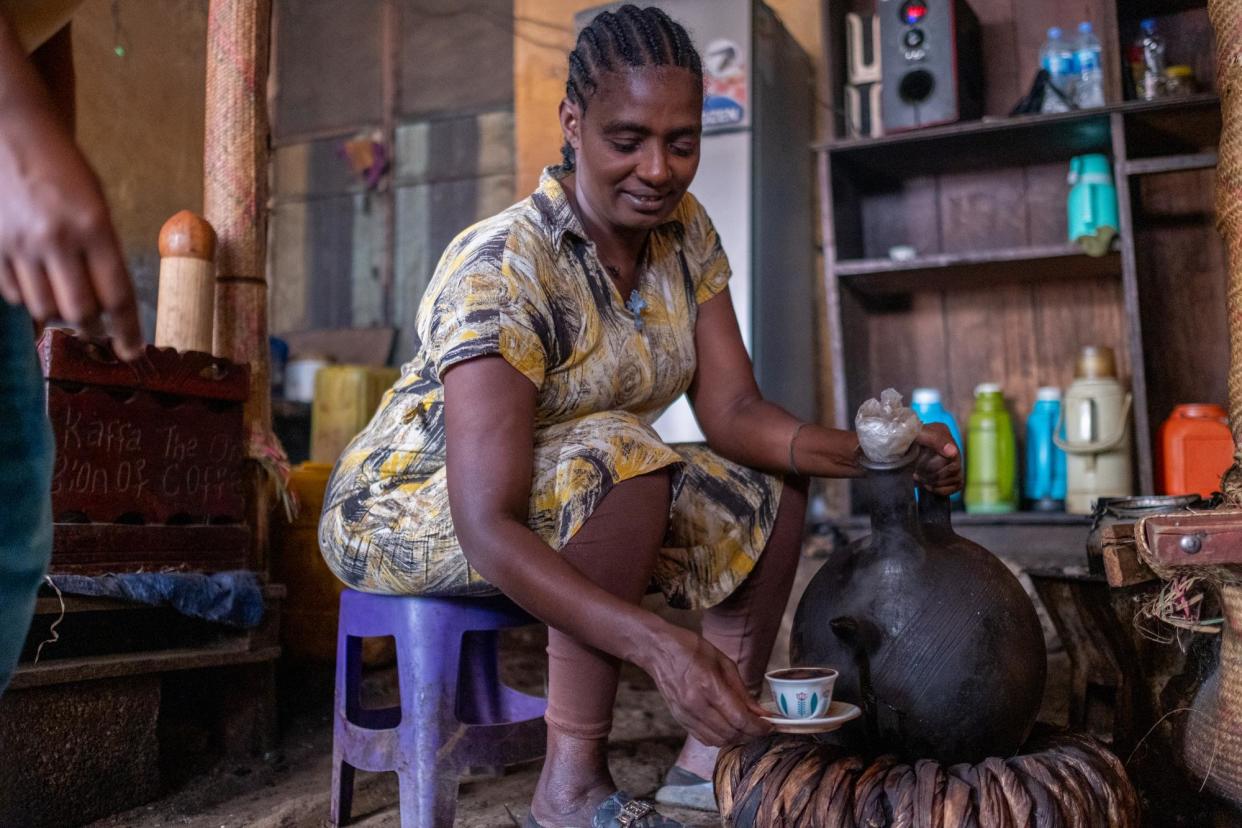‘It’s rude not to offer three cups’: the lengthy, beloved coffee rituals binding Ethiopians together

Drinking coffee takes time in Ethiopia, a nation of caffeine lovers. In her village in Kafa, Ethiopia’s coffee heartland, Hagre Bekele starts by roasting the raw green beans over an open fire. Then she grinds them by hand and brews them in a jebena, a bulbous, long-necked clay pot. The drink is ready when the coffee boils and almost overflows.
Her son, Abraham, serves the drink in small cups, filled to the brim, alongside thick chunks of bread and handfuls of roasted grains, a snack called kolo. When the first cup is drunk, Hagre brews the grounds twice more. Generally, it is considered rude not to offer three cups. She also burns incense: its aroma enhances the coffee’s taste, and some believe it keeps bad spirits away.
The whole process lasts about an hour. To make things more efficient, and to ensure they get a regular caffeine fix throughout the day, Hagre shares brewing duties with her neighbours. Hagre is in charge of the lunchtime coffee, while her neighbour, Woynitu Gebre, takes care of the morning round. In the evening, everyone goes to Hagre’s mother-in-law’s. It is a system they have had in place for decades and one replicated, in various forms, in millions of homes every day across Ethiopia.
“It is impossible for us to live without coffee,” says Hagre. “It is as important as food for us. When we drink it, we become strong.”
In much of Ethiopia, coffee is sweetened by heaped teaspoons of sugar, but most people in this area of the south-west prefer it without. Some, though, will add salt. On special occasions, butter infused with basil, oregano and cardamom is mixed in – which, says Woynitu, “tastes the best”. Another popular addition is tenadam, or rue, a medicinal herb.
Related: ‘We would not survive without coffee’: how rules made in Europe put Ethiopian farmers at risk
The ritual of sharing coffee is central to daily life, a chance to discuss news, plan farm work and share village gossip. “If we are depressed, it helps lift us,” says Woynitu.
But not everyone thinks hours drinking coffee are well spent. Bogale Desalegn, who lives a short walk away, disapproves. “Gathering together, drinking coffee, it takes up too much time. It is better to work,” he says, although he still drinks about four cups a day. “My family used to take turns with 10 other households, but now we only drink coffee together on holidays.”
Like all farmers in Kafa, Bogale relies on coffee. The beans he harvests from his one hectare of coffee trees make him about 30,000 Ethiopian birr (about £420) a year, enough to put his children through school and buy items he cannot grow on his farm. Ethiopia’s 5 million coffee-growing farmers produce half a million tonnes of beans a year, making it the world’s fifth-largest producer. Coffee is the country’s largest export and employs about 25% of the population directly or indirectly. “Coffee has made Kafa a wealthy place,” says Bogale.
Kafa’s forests are one of the few places where coffee grows wild, and the region claims to be the birthplace of the Arabica bean. Local legend says coffee was discovered here by agoat herder called Kaldi, who decided to try a handful of coffee beans after observing the energising effects they had on his goats when they inadvertently nibbled some. Soon afterwards, priests began chewing coffee beans to sustain themselves through lengthy prayer sessions.
Coffee then spread from Ethiopia’s monasteries to the Islamic world and eventually to Europe, according to the story. It is probably apocryphal, but its tellers point out the modern Arabic word for coffee (qahwa) sounds like Kafa.
Today, highly ritualised coffee ceremonies are a central pillar of Ethiopian weddings, funerals and religious celebrations, part of a shared social fabric that helps to bind together a geographically vast and culturally diverse country of about 120 million people. Women brewing coffee in jebenas set on charcoal stoves are ubiquitous in Ethiopia’s cities, present on almost every street corner.
Western-style coffee shops serving up milky macchiatos are increasingly popular, too. These have sprung up to serve Ethiopia’s fast-growing professional class, who do not have time to make traditional coffee at home. The best-known chain is Tomoca, which specialises in darkly roasted beans. Its cafes are modelled on Italian espresso bars, with high tables and no seats. It was founded in 1953 but has expanded rapidly in recent years. With more than 20 branches, it is the closest thing Ethiopia has to Starbucks.
Tesfamichael Wolde, an accountant drinking coffee at a downtown Addis Ababa branch of Tomoca, says that when he was growing up in Gurage, a rural region south-west of the capital, his family would share coffee-making duties with seven other families. Their turn was Wednesday. Now, though, he mostly drinks coffee outside his home because of the fast pace of city life.
“To make traditional coffee, you need time, so we can’t do it every day,” says Tesfamichael. “But it tastes the best, and we still try to have it when we can, especially at the weekend.”


